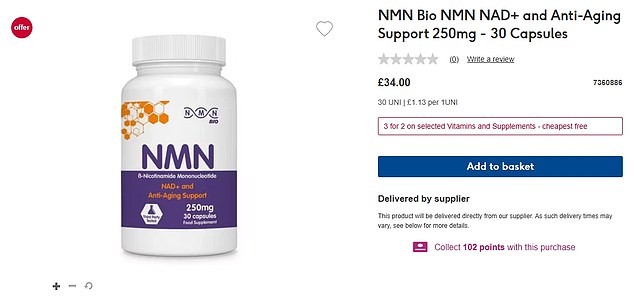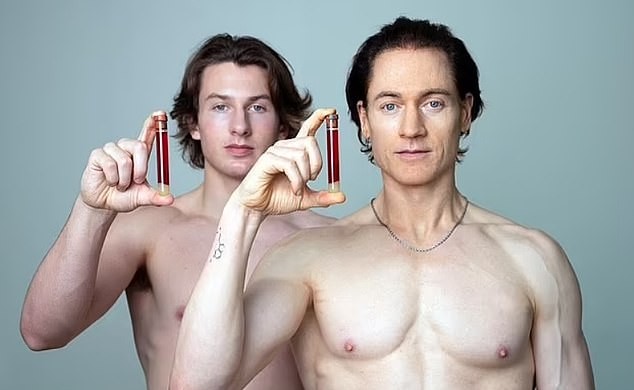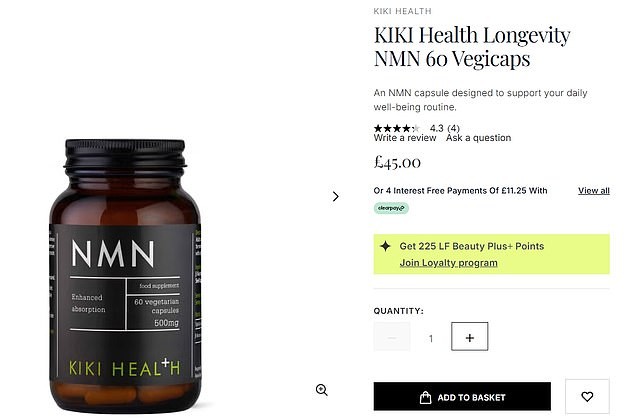£1-a-day miracle pill? NMN promises to shave decades off your age — but experts warn it’s not proven
Could a daily supplement found in Boots and other high-street shops really erase years from your age? Nicotinamide mononucleotide, or NMN, is marketed by some doctors as a ‘wonder’ pill that could boost energy, metabolism and even brain health. In the UK, 30 capsules can cost as little as £34 — about £1 a day — and advocates say NMN works by supporting NAD, a molecule that declines with age and helps power cells. Prominent figures like Bryan Johnson, the 47-year-old longevity entrepreneur who looks younger than his years, include NMN in his reverse-ageing regime. But many scientists urge caution: most evidence to date comes from mice or short human trials, and longer, higher-dose studies are needed to prove safety and real benefits.

In This Article:
What NMN is and why it matters
NMN is converted into nicotinamide adenine dinucleotide (NAD) in the body, a molecule found in every cell and essential for life. NAD fuels seven genes that govern ageing. NAD levels fall by about 50% as we age, potentially turning off the body’s defences against ageing and age-related diseases such as cancer, diabetes, heart disease and Alzheimer's. NMN supplements aim to support NAD levels as they decline, potentially helping cellular repair and longevity. Dr Paul Banwell, a Sussex-based plastic surgeon and longevity expert, told the Daily Mail: 'NMN and NAD supplements can knock years off your age.' He notes he personally uses ARTIS London Regenerative Complex, which contains sirtuin activators to boost NAD. Dr Sabine Donnai, a GP and founder of Viavi, adds: 'No other molecule comes close to helping your cells function optimally as NMN.'

What the science actually shows (and what it doesn’t)
Harvard geneticist David Sinclair has spent two decades investigating how to cure ageing and believes NMN is the best prospect for answers. In one study, mice fed NMN had aging cells and muscles that looked and behaved like those of young mice after just a week of NMN in their drinking water. Sinclair described the change as the equivalent of a 60-year-old’s cells and muscles transforming into those of a 20-year-old, with no negative side-effects reported in the study. But he cautioned that what works well in lab mice does not always translate to humans. Dr Cathy Slack of the University of Warwick warns more research is needed before NMN’s anti-ageing ability can be proved in people. Trials in humans have used high doses similar to those given to animals, and longer-term safety remains uncertain. A 2023 review noted that while NMN is rapidly gaining popularity, most studies so far are in cells or animals and that longer, larger, and better-designed human trials are needed. Some early human trials have suggested potential benefits, but results are inconsistent. Dr Leonard Josipovic, a plastic surgeon and supplement specialist, says people who take NMN often report feeling more energetic and sharper mentally, with possible benefits for cardiovascular health, muscle endurance, insulin sensitivity and resilience to oxidative stress.

Caution, reality, and what to do now
There is no consensus that NMN is a miracle pill. Experts say the best tools against ageing remain the basics: good sleep, regular exercise and a nutritious, vegetable-rich diet. Boots’ NMN capsules are 250 mg and listed as suitable for adults aged 25 and above; earlier animal studies used much higher doses, and the long-term safety in humans remains unproven. Early human trials have produced mixed signals: some high-dose studies in runners reported increased aerobic capacity, while other studies found low-dose NMN could improve muscle response but caused drowsiness in older adults. A 2023 review concluded that the evidence is intriguing but not definitive and that more longer, well-designed trials are required. If you’re considering NMN, consult a healthcare professional, weigh the potential benefits and risks, and keep an eye on new trial results as science closes in on clearer answers.


